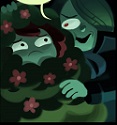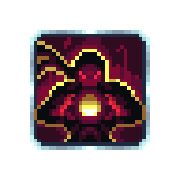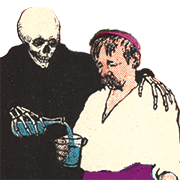|
Alignment makes the fundamental error of placing human motivations, convictions, and behaviors onto axes. They don't work like that. Good and evil aren't equivalent opposites. They dont describe mutually exclusive things. They reflect baskets of different societal attitudes about ethics, transgression, culpability, social obligation, conscience, religious directives, etc. and people do or do not agree/behave/ "align" to individual tenets within these baskets, from moment to moment and situation to situation. Each atomic unit of belief and behavior has no quantifiable "weight" by which it can be compare to others or used to derive an overall value of a person. This is also true of law/chaos, thinking/feeling, introversion/extroversion, or any other of these bullshit axes.
|
|
|
|

|
| # ? May 24, 2024 23:04 |
|
Tulip posted:What I'm saying is that I draw ever closer to a Payday 2 RPG. Every adventure is trying to get the thermal drill.
|
|
|
|
Leperflesh posted:Alignment makes the fundamental error of placing human motivations, convictions, and behaviors onto axes. They don't work like that. Barbarian: These are my axes: Law & Chaos
|
|
|
|
Leperflesh posted:Alignment makes the fundamental error of placing human motivations, convictions, and behaviors onto axes. They don't work like that. how very Virgo of you
|
|
|
|
Leperflesh posted:Alignment makes the fundamental error of placing human motivations, convictions, and behaviors onto axes. They don't work like that. You're just saying that because you're chaotic neutral. I did find the idea of instincts/impulses/whatever a freeing alternative, when I first encountered them. Dungeon World alignments seemed like a fair compromise of "your alignment means whatever you say but also you have a label for magical bullshit backward comparability." Assuming you feel compelled to play in the dnd sandbox, as I often do.
|
|
|
|
Tulip posted:Yeah I think this is largely correct and if anything feeds into me and Tuxedo Catfish treating the alignments as fundamentally alien to any actual, meaningful ethics. I don't know that I'd want to play such a game, I'm not sure I've got players that would be in a place for it, but I could imagine writing a pretty decent book that treats that more explicitly, that the Elemental Plane of Law is ruled by frankly racist pieces of poo poo and the existence of Lawful Good Angels at all is kind of a problem. To clarify: In the original D&D in which law and chaos were the only alignments, they were a pretty clear proxy for the battle lines drawn in the course of colonial conquest. In any modern or even semi-modern version of D&D that features the full 3x3 grid, law/chaos is completely void of any philosophical or ethical content. It kind of has an aesthetic resonance where it's like monochrome vs. rainbow, geometric vs. wavy, etc, but that's it. Best simply ignored and/or removed.
|
|
|
|
Magnetic North posted:Every adventure is trying to get the thermal drill. Really the drills are just Shards of Chaos, that the Law Elementals are trying to destroy in their own, needlessly destructive way.
|
|
|
|
Anyway, the only good version of "law" vs. "chaos" was of course in the 4th edition of D&D, in which the big metaphysical dipole was between the abstraction of the astral sea on one hand and the raw materiality of the elemental chaos on the other.
|
|
|
|
Tulip posted:Please the most DnD answer is to use Myers-Briggs. Ah! I see you have seen Reichstar! Jungian psych, but ehh? 
Humbug Scoolbus fucked around with this message at 18:50 on Sep 4, 2022 |
|
|
|
This talk of alignment systems is interesting, I never really liked the 3x3 grid system, and I've been thinking on how a alignment system would work in my game, and I'm thinking of making it more based on alignment to specific gods being cool with or hate certain kinds of actions, and each divine is tied to a set of classes. So if you're a class of the divine of knowledge, your divine isn't going to like it if you lie, but of course the divine of Trickery is fine with it. I don't know if that makes sense and will work in my game. I don't know what a good replacement system would be for a game like D&D 5e, since obviously that doesn't really work for it.
|
|
|
|
Foolster41 posted:This talk of alignment systems is interesting, I never really liked the 3x3 grid system, and I've been thinking on how a alignment system would work in my game, and I'm thinking of making it more based on alignment to specific gods being cool with or hate certain kinds of actions, and each divine is tied to a set of classes. So if you're a class of the divine of knowledge, your divine isn't going to like it if you lie, but of course the divine of Trickery is fine with it. I don't know if that makes sense and will work in my game. this is kiiiiiiinda what 13th Age did? you could take a look at that for
|
|
|
|
Oh? I've ran a few campaigns of 13th age and played it, and I don't remember that, I'll have to look again. Looking, I see they put the icons on a 3x3 L/C G/E grid, so it's not really much better than the old 3x3 grid. Unless there's more I'm missing.
|
|
|
|
Foolster41 posted:Oh? I've ran a few campaigns of 13th age and played it, and I don't remember that, I'll have to look again. i was more talking about how it mechanically models the relationships each character has with the icons, which i always thought was way more interesting than the alignment grid. it's neat!
|
|
|
|
Put together your own bespoke alignments from tags, like BESM but for morality.
|
|
|
|
Good, now let's do Palladium allignments:quote:
|
|
|
|
Leperflesh posted:Alignment makes the fundamental error of placing human motivations, convictions, and behaviors onto axes. They don't work like that. Alignment makes the fundamental error of placing what should be something that highlights campaign/setting themes and turning them into universals. In oD&D alignment was handled properly for that game's themes (I'm condoning the implementation here not the themes themselves) with a single L/N/C axis. oD&D was a Fantasy Western with Law representing "Civilisation" back west that might have had things to offer but would crush the indivdiuals, Chaos representing the natives beyond the Keep on the Borderlands and Neutrality representing trying to keep the balance for the ordinary people (human and allied, naturally). And good vs evil? Not really metaphysical. Meanwhile Dragonlance is a giant Saturday Morning Cartoon with Good vs Evil while law and chaos were secondary where the rubber met the road. And nine point alignment? Doesn't really match anything.
|
|
|
|
Ferrinus posted:Anyway, the only good version of "law" vs. "chaos" was of course in the 4th edition of D&D, in which the big metaphysical dipole was between the abstraction of the astral sea on one hand and the raw materiality of the elemental chaos on the other. These sourcebooks were great, too
|
|
|
|
Foolster41 posted:Oh? I've ran a few campaigns of 13th age and played it, and I don't remember that, I'll have to look again. So as you probably know, the icons cover the usual set of powerful NPCs/deities you find in your average D&D campaign, along with their moral outlooks. The Emperor upholds law no matter what, the Great Gold Wyrm promotes good causes by lawful means and has law serve the greater good, the Diabolist is a menace to life and limb and cannot be trusted, and so on. You could describe a character's morals by how they align with the icons' causes and use the icon relationship system to track the complexity of that; someone could be 100% in agreement with an icon, or opposed to it, at the simpler end, or have relationships with several to draw a more multilayered picture. You could even deviate from the icon relationships as written and track the influence of character actions for every PC you have across all 13 icons, if you really like spreadsheets.
|
|
|
|
As much as I loathe Jeff Rients now, I still go back to his descriptor of alignment as something you are actively pledging towards rather than what you are inherently. 95% of people that you’re meeting are Neutral, with only the people who are like “I hereby align myself with the lawful/chaotic forces of the universe” being Lawful or Chaotic respectively.
|
|
|
|
Lumbermouth posted:As much as I loathe Jeff Rients now, I still go back to his descriptor of alignment as something you are actively pledging towards rather than what you are inherently. 95% of people that you’re meeting are Neutral, with only the people who are like “I hereby align myself with the lawful/chaotic forces of the universe” being Lawful or Chaotic respectively. I. Declare. Neutrality!
|
|
|
|
The 4E scale of "Lawful Good - Good - Unaligned - Evil - Chaotic Evil" was also immensely helped along by the facts that a) it explicitly said the majority of people were unaligned and b) nothing whatsoever in the entire system had any impact on your alignment
|
|
|
|
Much as I like other aspects of that system, Pathfinder 2E having good/evil/law/chaos as damage types feels like a step back in terms of alignment nonsense. (I'm aware they address this in the GMG and am still mulling over which rules variant is the least annoying to patch in.) That and there's no way to play champions that are LN/N/CN.
|
|
|
|
Foolster41 posted:I'm thinking of making it more based on alignment to specific gods being cool with or hate certain kinds of actions, and each divine is tied to a set of classes. So if you're a class of the divine of knowledge, your divine isn't going to like it if you lie, but of course the divine of Trickery is fine with it. I don't know if that makes sense and will work in my game. This is what I do in my games, except that there's no class requirement. Any character can worship any god, and any detect good / protection from evil type magic only works according to the opinion of the God who provided it. My gods also tend not to be able to take clerics' and paladins' powers away. Instead, there's a low-level ritual most priests learn which points them towards wherever the god needs them. If you betray your god's principles all over the place, a bunch of priests start having their divine guidance point them your way -- and if you've been really bad, you start detecting as evil to other priests of your god.
|
|
|
|
There's a fundamental problem with the alignment systems used in rpgs that hasn't really been touched on yet Everything that's actually interesting about moral behaviour in fiction is about inconsistency and regret and when people make decisions that don't mesh with the rest of their selfimage. To produce interesting games we have to go out of our way to actually make choices that produce this kind of situation - having an alignment or virtues or ethical guidelines on your sheet actively kneecap anything interesting happening, because they shortcircuit player decision making and make it really obvious what choice is the 'correct' one to make in any given situation. Like, in a TTRPG, you don't actually have any costs for taking actions that match your character's selfimage - it's not actually challenging or interesting in any way to follow a code of conduct or similar, because you just do it, there's no laziness or distraction or doubt or anything that gets in your way of 'hmm, i'm a paladin, i do paladin things'. Exalted had the same issue with virtues - if you see valor 5 on your sheet, you're not going to try and run away because it feels like you're playing wrong, same with compassion etc. But the most interesting gameplay comes up when characters in the fiction do things outside of their defaults - the paladin is thoughtless and causes harm, the baddie is struck by compassion, a character's focus shifts. The mechanics should be about incentivising this kind of behaviour - if I make a Valor 5 exalted character, punishing me for trying to run away is completely rear end-backwards because obviously i'm just ... not going to. Set up the mechanics instead so we can do 'my selfimage is the person who never runs - let's have me fail at that, and we can explore what that does in play'
|
|
|
|
Also worship's the same deal - 'i am a priest of my god therefore i will take the obvious action that my god would want' is not actually any kind of challenge in play. If you set things up so that straying from your faith or doubting your god is not obviously mechanically awful, then you open up space for all the interesting characterisation.
|
|
|
|
xiw posted:There's a fundamental problem with the alignment systems used in rpgs that hasn't really been touched on yet This is good. One of the things I tend to put very early in my characters is "what is their contradiction, and what is their lack." I want to have characters that have at least two impulses that they can't meet at the same time, and to have some sort of identifiable emptiness that cannot be readily resolved that compels them to be active forces in the universe. This is not something that I find RPGs support natively, it's a choice that I make in the fiction layer in order to give myself something to guide me when I'm at the table.
|
|
|
|
I have no idea who will ever play Pendragon with me, but this is one of the things I find most appealing about it. Your code of ethics is mechanically codified and you actually get moments of, like, roll your Temperance or else you make a fool of yourself at this summer fête.
|
|
|
|
Pendragon's mechanics for this are kind of wild, but they do contribute to what I was asking for which is sometimes your character does things that don't match your primary selfimage - your Chaste 16 knight has a 1/20 chance of critting any given Lust roll and being heavily rewarded. (the 1/20 chance of going mad and losing your character for the session on any given trait roll is bloody awful though)
|
|
|
|
xiw posted:Also worship's the same deal - 'i am a priest of my god therefore i will take the obvious action that my god would want' is not actually any kind of challenge in play. If you set things up so that straying from your faith or doubting your god is not obviously mechanically awful, then you open up space for all the interesting characterisation. To steal from the ancient Paladin Thread's observations, one of the best parts in Morte d'Arthur is when Lancelot is wracked with guilt for having an affair with Guinevere, he's still explicitly the incarnation of The Perfect Knight and given overt divine grace from God because of it. And Lancelot just has to deal with that. It's the exact opposite of the D&D paladin's fall, the drama comes from how he can still be so good even if he's not literally perfect something something God's will something something (please no one mention that Mallory might've had an affair with his lord's wife that would clearly be unconnected shhhhh).
|
|
|
|
xiw posted:(the 1/20 chance of going mad and losing your character for the session on any given trait roll is bloody awful though) This is only on passion rolls and has been modified for 6e
|
|
|
|
Trad Games Chat: nut torture, though distasteful, is necessary means to extract info
|
|
|
|
|
Nessus posted:Trad Games Chat: nut torture, though distasteful, is necessary means to extract info
|
|
|
|
xiw posted:Also worship's the same deal - 'i am a priest of my god therefore i will take the obvious action that my god would want' is not actually any kind of challenge in play. If you set things up so that straying from your faith or doubting your god is not obviously mechanically awful, then you open up space for all the interesting characterisation. I feel like any kind of worship or alignment setup that's intended to have a mechanical effect should encourage you to take mechanically "bad" decisions(i.e. give up on treasure, let a defeated enemy go, do wizard cocaine, pick a fight you would logically avoid by not letting you simply ignore an insult, etc.) and then provide a carrot to encourage that. Like, any time you "gently caress up" motivated by your morality or path of worship, you get a metacurrency token of some sort. After all, that seems to be the point of most real-world paths of worship and morality, that you have to ignore things you want in your gut and do what's "right" even if it's costly, risky or unpleasant, plus it also generates excitement and adventure and is, in my opinion, more interesting than punishing people for not following their chosen path.
|
|
|
|
I really like the way Hillfolk does it, where your character's is defined by two mutually contradictory things they're driven to be (eg justice vs. mercy) and you get one xp if during a session you end up showing one side of the character, or two if you show both.
|
|
|
|
xiw posted:There's a fundamental problem with the alignment systems used in rpgs that hasn't really been touched on yet This is the core gameplay loop of the Cortex+ Smallville RPG and it loving owned so hard. Instead of ignoring the source material’s penchant for melodrama and cheap irony it mechanized it by giving incentives for characters who valued Truth to lie, lovers to betray one another, etc. The most excellent example of Ken Hite’s dictum about bad media making for good gaming. Parkreiner fucked around with this message at 12:18 on Sep 5, 2022 |
|
|
|
xiw posted:There's a fundamental problem with the alignment systems used in rpgs that hasn't really been touched on yet I'd love to hear other people's ideas for mechanics that create more engaging interactions between a character's personality, motivations, and choices. (Other than the Hillfolk and Smallville/Cortex stuff, which I've definitely drawn inspiration from.)
|
|
|
|
2d20 games have started including more and more Drives/Values in their mechanics, which peaked with Dune, whose Drive/Value Statements are nearly identical to Smallville’s. This isn’t a huge surprise since the line developer often mentions being a huge Cortex fan.
|
|
|
|
We are trapped in the belly of this horrible alignment chart And the alignment chart is bleeding to death
|
|
|
|
I've been playing a lot of XCOM 2 lately, and I'd like to post about the Advent Priest introduced with the War of the Chosen expansion, this is an enemy unit that adds more psionic powers to the opposing forces, where it used to be you'd only really get Psionic pshenanigans from Sectoids I consider them to be the most difficult enemy to deal with, because insofar as XCOM 2 is a great example of well-crafted tactical tabletop RPG system, the Priest is the embodiment of the "Save-or-Suck" spellcaster they have two primary abilities: Mind Control, and Stasis. Mind Control should be fairly self-explanatory - if your XCOM soldier fails to resist, they become controlled by the Priest for two turns, and the only way to stop it is to kill the Priest itself. You can mitigate against Mind Control by having your soldiers wear a Mind Shield item, but... ... the Stasis "spell" is unavoidable. When cast, the target loses their turn entirely. They can't be shot at and can't take damage, but they can't take any actions either. And killing the Priest does not remove Stasis, nor is there any other means of "dispelling" Stasis, once its been cast. it's incredibly disruptive because while there are lots of ways to mitigate against getting shot at, getting blown up, or even other debuffs (wear a Mind Shield! use the Medikit to recover from Disorientation!), Stasis just sticks to you no matter what, and it's this inability to protect against it or remove it that makes it a lot more powerful than the trade-off of "well, the soldier is also protected from all damage", because the one turn of stun is an eternity when you've got various tactical crises stacking up. I bring it up because it's such a great encapsulation of the paradigm in Dungeons & Dragons where shutting out/shutting-down a monster is so powerful because it skips the HP/damage dichotomy entirely. If I had to face down six Mutons or whatever, that's just a knock-down, drag-out fight, but throw a Priest into the mix and suddenly things get more complicated because you can lose a turn even if your soldier is still at full health and loaded for bear. finally, the Priest also has the Sustain ability: if you kill a Priest, there is a better-than-50% chance that instead of dying, they simply go to 1 HP, then place THEMSELVES into Stasis. So when you do encounter a Priest, even if you manage to set-up your turn that you can deal enough hits and damage to take them out on the same phase that you see them, if Sustain triggers, then they STILL get to act for one turn guaranteed and what do they invariably do with that one turn that they have? put one of your troopers into Stasis there's a part of me that's complaining, but there's also a part of me that really likes the concept of a well-designed monster, as crafted by a particularly devious DM
|
|
|
|

|
| # ? May 24, 2024 23:04 |
|
Yep, that sounds like a terrible monster. At least in XCOM you've got a squad to play with rather than your one player character being out of your control. The thing that kills Firaxis' XCOM games for me is how aliens are deployed in packs which do nothing until one of your characters can see them. This means that your most important concern is to ensure that you never activate more than one pack at a time, as otherwise combats are much harder. It encourages the player to creep around the map slowly, and often punishes character classes like the melee-focused "ranger" class for using their abilities since they have to get close to use them, which can often trigger off another pack. It's also immersion-killing - the aliens are just waiting around for you to aggro them like a bad MMORPG, rather than doing alien stuff out in the darkness.
|
|
|













































